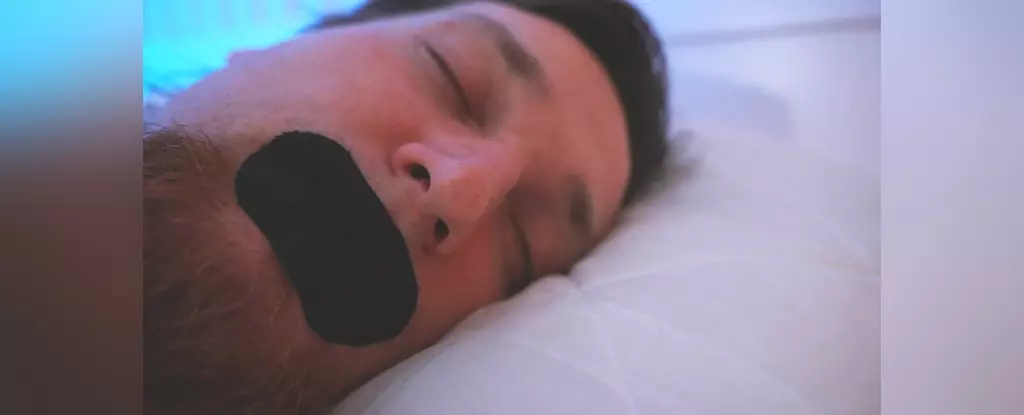The advent of social media has undoubtedly changed the way we perceive and tackle personal health issues. One trend that has surged in popularity is mouth taping—a purported technique that claims to enhance sleep quality by keeping one’s mouth closed overnight. Advocates suggest that adhering a strip of porous medical tape across the lips can tackle myriad concerns including snoring, poor jawline definition, and even obstructive sleep apnea. Yet, beneath the allure of a simple solution lies an intricate web of potential risks and unsubstantiated claims.
The Science—Or Lack Thereof
Upon examining the scientific literature surrounding mouth taping, the enthusiasm quickly dissipates. While numerous TikTok influencers boast miraculous outcomes, actual research provides a sobering perspective. Studies conducted on the effects of mouth taping typically focused on patients dealing with obstructive sleep apnea or various forms of mouth breathing. Though a couple of these studies indicated marginal improvements in patients with mild apnea, the overall findings were far from persuasive.
The reality is that most investigations into mouth taping suffer from serious methodological flaws. Many studies demonstrated poor participant follow-up, did not accurately represent the entire affected population, or overlooked confounding factors that could skew results. This raises a critical question: if the existing literature is largely inadequate, what guarantees do we have that mouth taping is effective—or, more importantly, safe?
Risks Associated with Mouth Taping
While it may seem harmless to tape one’s mouth shut at night, medical experts warn of the underlying risks. For individuals with nasal obstructions—whether from a deviated septum, sinus infections, or other respiratory issues—obstructing oral breathing could lead to severe consequences, including asphyxiation. This stark warning further confirms that mouth taping is not a ‘one-size-fits-all’ remedy.
Moreover, the reliance on such a superficial measure can potentially mask deeper health issues. Instead of addressing root causes, such as airway blockages caused by anatomical irregularities, those suffering from sleep disturbances might find themselves drawn into a risky cycle where a quick “fix” is favored over comprehensive medical treatment.
The Pitfalls of Quick Fix Solutions
The mouth taping phenomenon exemplifies a broader issue in health and wellness discourse—our society’s collective craving for quick fixes. We tend to gravitate towards trends that promise swift solutions without the need for deep understanding or intervention. This is evident in countless health fads, from detox teas to fad diets.
While the allure of a simple solution is strong, it often detracts from important medical advice. Health issues like sleep apnea or chronic snoring should compel individuals to seek professional help rather than risking their well-being by relying on unverified social media hacks. Proper diagnoses from healthcare professionals can lead to effective, tailored treatments that address not just symptoms, but the root of the problems.
Informed Decision-Making is Key
The urgency surrounding health improvement should encourage critical thinking, especially in our digitally-driven age. Credible sources and medical guidance should take precedence over anecdotal evidence found on social media platforms. This prompts an essential conversation about how healthcare is portrayed and perceived online.
Rather than capitulating to the siren call of viral trends, it’s crucial to remain informed and to consult healthcare professionals when grappling with persistent issues. Empowering individuals to take charge of their health through education and clinical guidance is paramount in an age rife with misinformation.
While mouth taping may appear to offer a convenient solution, the associated risks and lack of scientific validation demand a cautious approach. As individuals navigate the complexities of sleep-related issues, it’s vital to prioritize well-rounded insights and expert opinions over flashy social media trends. The pursuit of better sleep should never compromise one’s health or well-being. Prioritizing informed healthcare choices is integral to achieving lasting improvements in sleep quality and overall health.


Leave a Reply